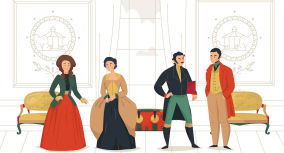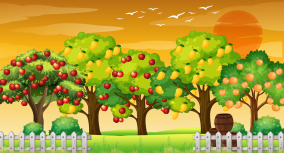If you’re looking for descriptions of Candide characters, you’re in the right place! Candide, Pangloss, Cunégonde, and other characters in Candide are analyzed in this article by Custom-Writing.org experts.
🗺️ Candide Character Map
Below you’ll find Candide character map. It contains all the key characters that appear in the story.

👱 Candide
Candide is the main character of the same-name satirical novel by Voltaire. He is an illegitimate nephew of the Baron, which makes him half-noble. Life throws Candide into different adventures, but his only motivation is to reunite with his beloved Cunégonde. He travels the world and tests the optimism philosophy, which professor Pangloss taught him at the beginning of the text.
Candide Character Analysis
Candide is the man of honor, as he calls himself in Chapter 27. He is honest, brave, and kind. He is also slightly naïve, which makes him trust people more than he should. These qualities explained the author’s choice for his name. “Candidus” is translated from Latin as “white,” implying the purity of his intentions.
Candide perceives Pangloss’ philosophy as a tabula rasa. He does not contradict the professor. Throughout the text, the man tries to find at least the minor confirmation of optimism. Candide loses his illusions of the world only when the woman he loved does not bring him the happiness he has strived for.
Still, Candide obtained extensive experience and knowledge of the world in his wanders. The route he covered was unthinkable for a person of the 18th century. The itinerary covers Germany, Holland, South America, France, England, Italy, Turkey, and the mythical country of El Dorado. But this knowledge does not disillusion him. He wants to find the best in people and life.
Besides kindness, this fact also indicates his simplicity. He trusts anyone, from a philosophy teacher to some queer customers of an Italian inn. Candide does not have his own opinion of the world. But once his dream of perfect happiness with a beautiful wife fades, he is ready to question everything he used to believe.
In Chapter 30, a wise Dervish says: When his highness sends a ship to Egypt, does he trouble his head whether the mice on board are at their ease or not?” The only way to tolerate the imperfection of human life is to work. Thus, Candide rejects Pangloss’ optimism and Martin’s pessimism.
Candide: Quotes
There can be no effect without a cause, the whole is necessarily concatenated and arranged for the best. It was necessary for me to have been banished from the presence of Miss Cunegonde, to have afterwards run the gauntlet, and now it is necessary I should beg my bread until I learn to earn it; all this cannot be otherwise.
Candide, chapter 3
Alas! I know this love, that sovereign of hearts, that soul of our souls; yet it never cost me more than a kiss and twenty kicks on the backside. How could this beautiful cause produce in you an effect so abominable?
Candide, chapter 4
We are going into another world, and surely it must be there that all is for the best. For I must confess there is reason to complain a little of what passeth in our world in regard to both natural and moral philosophy.
Candide, chapter 10
Good God! I have killed my old master, my friend, my brother-in-law! I am the best-natured creature in the world, and yet I have already killed three men, and of these three two were priests.
Candide, chapter 15
[Optimism] is the madness of maintaining that everything is right when it is wrong.
Candide, chapter 19
All that is very well, but let us cultivate our garden.
Candide, chapter 30
🧓 Pangloss
The teacher of Cunégonde and Candide is a wise and educated man. Throughout the text, he always looks for the causes and consequences of events that confirm his belief that everything is for the better. His pet phrase that he lives in “the best of possible worlds.”
That this character is unprepared to live outside his imagination of good and evil things. Pangloss survives execution, auto-da-fe, autopsy, syphilis, and galley servitude just to end his life on a farm, irritating other people with idle talk. When Candide asks for help, he still philosophizes instead of doing something. Pangloss’ thought process is absurd and pointless. When his friends work in the garden, he sits and talks.
Panglossianism
Pangloss follows the doctrine of Gottfried Wilhelm Leibniz, a German philosopher of the Enlightenment. The character’s world view is a simplified and exaggerated version of Leibnitz’s principles of optimism (“God assuredly always chooses the best”) and “sufficient reason” for anything to exist. However, Panglossianism means naïve optimism that crashes against reality.
Panglossian: Meaning
Panglossian is an adjective that characterizes a highly optimistic person. To define such people in a sentence, their foolish belief in the best of things persists when they face extraordinary hardships. This perception of the world limits their abilities to act when necessary. They remain idle because they think that the worst circumstances will bring them good.
Pangloss: Quotes
It is demonstrable that things cannot be otherwise than as they are; for all being created for an end, all is necessarily for the best end.
Candide, chapter 1
This present Paquette received of a learned Grey Friar, who had traced it to its source; he had had it of an old countess, who had received it from a cavalry captain, who owed it to a marchioness, who took it from a page, who had received it from a Jesuit, who when a novice had it in a direct line from one of the companions of Christopher Columbus. For my part I shall give it to nobody, I am dying.
Candide, chapter 4
It is true, that you saw me hanged. I should have been burnt, but you may remember it rained exceedingly hard when they were going to roast me; the storm was so violent that they despaired of lighting the fire, so I was hanged because they could do no better.
Candide, chapter 28
Providence has then brought you amongst us again, my poor child! Do you know that you cost me the tip of my nose, an eye, and an ear, as you may see? What a world is this!
Candide, chapter 30
There is a concatenation of events in this best of all possible worlds: for if you had not been kicked out of a magnificent castle for love of Miss Cunegonde: if you had not been put into the Inquisition: if you had not walked over America: if you had not stabbed the Baron: if you had not lost all your sheep from the fine country of El Dorado: you would not be here eating preserved citrons and pistachio-nuts.
Candide, chapter 30
👸 Cunégonde
Cunégonde is a noble lady who spent half of her life in a wealthy castle. Her father, the Baron, sent the young man she liked to exile. Shortly after that, Bulgar soldiers invaded her home castle, raped the women, and killed her family. Like every other woman in the novel, she suffers from violence and abuse. She used to be a woman of high social standing but ends up in servitude. Cunégonde’s brother is shocked by her looks at the end of the book. Who could preserve their belief in happiness after such misfortunes?
She grows to be materialistic and harsh. When Candide kills Don Issachar and the Grand Inquisitor, she regrets that she will not find another similar source of income. Cunégonde agrees to marry Don Fernando just after a 15-minute pondering. If she had rejected the proposal, Candide would have been executed. After all, she loves him.
Cunégonde’s meaning in Candide represents the vainness of human dreams. She is beautiful but inaccessible, but when Candide reaches her at long last, she is already ugly and wrinkled. Cunégonde also demonstrates how feeble any beauty is in the face of the horrors of reality.
Cunegonde: Quotes
A modest woman may be ravished once, but her virtue is strengthened by it.
Candide, chapter 8
At last my Jew, intimidated, concluded a bargain, by which the house and myself should belong to both in common; the Jew should have for himself Monday, Wednesday, and Saturday, and the Inquisitor should have the rest of the week.
Candide, chapter 8
Pangloss most cruelly deceived me when he said that everything in the world is for the best.
Candide, chapter 8
Who was it that robbed me of my money and jewels? How shall we live? What shall we do? Where find Inquisitors or Jews who will give me more?
Candide, chapter 10
Alas! My good mother, unless you have been ravished by two Bulgarians, have received two deep wounds in your belly, have had two castles demolished, have had two mothers cut to pieces before your eyes, and two of your lovers whipped at an auto-da-fé, I do not conceive how you could be more unfortunate than I.
Candide, chapter 10
👴 Martin
In Candide, Martin is the diametrical opposite of Pangloss. He is a pessimistic and unhappy man. He believes that this world exists to draw people mad, and people are inherently evil.
We meet the character when Candide looks for some company on his way from Buenos Aires to Venice. Candide purposefully searched for the most miserable man to test Pangloss’ philosophy. Martin is an honest but poor man of letters, robbed by his wife and betrayed by his children. He lost his only job and was persecuted by some religious activists. There were more miserable people than Martin, but he was a philosopher, which made him an enjoyable companion for Candide.
On their voyage, they meet lots of pain and suffering. When they see ship wreckage, Martin remarks that God punished the villain, and Devil killed the rest. He is sarcastic about optimism and sees only hate, murder, and envy in anyone they meet.
At the end of the text, Martin and Candide share the belief that the only way to make life tolerable is to work hard and think less.
Martin: Quotes
I own to you that when I cast an eye on this globe, or rather on this little ball, I cannot help thinking that God has abandoned it to some malignant being.
Candide, chapter 20
I scarcely ever knew a city that did not desire the destruction of a neighbouring city, nor a family that did not wish to exterminate some other family. Everywhere the weak execrate the powerful, before whom they cringe; and the powerful beat them like sheep whose wool and flesh they sell.
Candide, chapter 20
[Paris] is a chaos—a confused multitude, where everybody seeks pleasure and scarcely any one finds it, at least as it appeared to me.
Candide, chapter 21
You know that these two nations are at war for a few acres of snow in Canada, and that they spend over this beautiful war much more than Canada is worth.
Candide, chapter 23
Let us work without disputing; it is the only way to render life tolerable.
Candide, chapter 30
🎭 Minor Characters in Candide
Cacambo
Candide meets Cacambo in South America and hires him as a valet. The man is honest, responsible, and devoted to the protagonist. He ensured Candide’s and Cunégonde’s relationship grow into a marriage.
Despite all his positive qualities, we should not forget that Voltaire’s novel is a satire. The character’s name meaning is “an excrement.”
He is the one who tells Candide about what happens to Cunégonde in Turkey. This story was the first blow that shattered Candide’s prospects for a happy life. Symbolically, he was excrement that spoiled everything just by reason of its existence.
Paquette
In Candide, we learn about her from the first chapter. Cunégonde sees her having sex with Pangloss. She survives the attack on Thunder-ten-Tronckh, where she was a maid of the Baron’s wife. Paquette becomes a street prostitute and fakes happiness to please men who pay her. Candide sympathizes with the woman and gives her a large amount of money. In the end, we learn that the money made her even more miserable than before.
The Old Woman
The Old Lady went through more hardships than any other character. She is the opposite of Senator Pococurante in Venice, who has everything a person could wish but is unable to enjoy it. The woman lived in poverty (but used to be wealthy) and experienced the death of her beloved one, abuse, humiliation, and hard work. She accepts the reality as it is (bad enough) but remains hopeful for the future.
Jacques (the Anabaptist)
Jacques is briefly present in the text, from chapters 3 to 5. He represents the Christian ideal of self-sacrifice (in Voltaire’s perception). He takes care of hungry and sick Candide and pays for Pangloss’ treatment of syphilis. Still, the “honest Anabaptist” produces expensive and exotic “Persian stuffs” in Holland. Everyone has his sin. During a voyage, Jacques tries to help a sailor and drowns in the ocean. Pangloss prevents Candide from helping him. Voltaire suggests that good deeds dictated by religion rarely bring a kind response.
The Farmer
Candide meets the Farmer in the concluding chapter, on his way from the Dervish. The Farmer sits on his doorstep under an orange bower. He looks satisfied with his life. When Pangloss asks the old man about the latest events, he says, “I content myself with sending there for sale the fruits of the garden which I cultivate.” The Farmer invites Candide and his friends for dinner, and his happy household impresses Candide. It brings the protagonist to the idea that work is the only thing that can make existence tolerable.
The Grand Inquisitor
The Grand Inquisitor personifies the hypocrisy of religious workers. He is supposed to abstain from relationships with women but eager to condemn Don Issachar to auto-da-fé merely because he does not want to sell him Cunégonde. The character represents the abuse of power that was a regular feature for church figures in those days. He treats Cunégonde as his property (like many other male characters of the novel).
The King of El Dorado
The King of El Dorado is one of the few positive characters in Candide. The paradox in this miraculous city is created by the endless resources which do not spoil the citizens. The King is wise and hospitable. He treats all his subordinates as equals and thinks that manners and law should ban tyranny.
Thank you for reading this article! You might also want to take a look at Candide essay topics collection. Another great option is using our topic-generating tool. Any questions left? Check the QA section!






